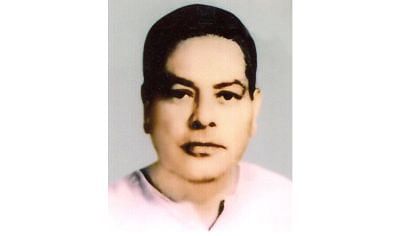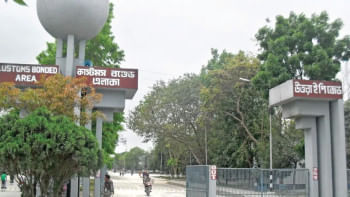Remembering Mohon Mia

Mohon Mia
The political, social, economic landscape of India was vastly different at the time when Yousuf Ali Chowdhury, popularly known as Mohon Mia, was born in an ancient zaminder family of East Bengal. The year of his birth, 1905, coincided with East Bengal briefly being accorded the status of a separate province.
Muslims, having lost their ascendancy following the collapse of the Moghul Empire, were confused, bitter and withdrawn. A sense of helplessness had set in the Muslim psyche and for generations they suffered in silence. Those who took bold and seemingly rebellious action, sadly and mistakenly characterised as communal, were in fact challenging an unjust and immoral social order.
Born in the lap of luxury, Mohan Mia could have chosen to live a life of comfort. Instead, he was troubled from a very young age by the environment around him. Mohon Mia lost his father when he was eighteen. His elder brother Lal Mia was at that time a Congress politician. Even as a student of Class Ten he revolted against and successfully changed the humiliating manner in which Muslim students were made to drink water by cupping their hands instead of being provided proper drinking arrangements.
While these practices moved him deeply he knew that to transcend the barriers of poverty proper and pragmatic education was vital. Today, as we speak of agriculture and its fundamental role in lifting the country from poverty, one is struck by the visionary role of Mohon Mia. Baitul Aman agricultural and educational project was his brainchild. Inaugurated in 1945 it was conceived as an engine to generate scope for enhancing agricultural productivity.
Thus, it was no surprise that in his teens Mohon Mia should join the Krishak Proja Party of Sher e Bangla A.K. Fazlul Hoque. Under this legendary figure the young and restive soul of Mohon Mia was plunged into the world of enlightened politics.
In his quest to bring the light of education for the less fortunate sons and daughters of Faridpur Mohon Mia set up various educational institutions -- Maizuddin High Madrassa, Halima Students' Home, named after his mother, are some of them. These institutions gave students free lodging and meals, thereby relieving the burden on their farmer parents.
When he was chairman of Faridpur District Board, he built numerous roads, bridges and schools. In his fifteen years of leadership of the Board he made strenuous efforts to rid Rajbari of kalazar and malaria, which were a curse for the people of the district.
Politics and not the play of power ran through the veins of this charismatic personality. In his quest to build a more humane society it was this impulse more than anything else which attracted him to the tears and tumult of politics. He set a rare example of making way for a respected figure of Faridpur, Maulvi Tamizuddin Khan, for membership of the legislative assembly when he could have gained the seat for himself.
Perhaps this trait earned him the title of "King Maker." Passion for politics for a variety of altruistic reasons finally propelled him towards winning a seat in the legislature in 1937 at a relatively young age of 32. He could have claimed a berth in the cabinet but was reluctant to be encumbered with ministerial obligations. As a confidant of Sher e Bangla he zealously worked for the abolition of the zamindary system. Quite an unusual mindset for someone who was himself a landlord.
For Mohon Mia, more than the pomp and ceremony of power, it was important to bring social changes by means of power. Mohon Mia stayed back in the Muslim League when Sher e Bangla left the coalition. However, he maintained an intimate and lifelong attachment to the great leader.
One of the stalwarts of Muslim League, he campaigned actively for Jukto Front let by Sher e Bangla, Suhrawardy and Maulana Bhasani. He also worked closely with Sheikh Mujibur Rahman. Following the Jukto Front victory he had a brief stint as minister. He was steadfast in his stand for the cause of East Pakistan.
Mohon Mia was in the vanguard of the Pakistan movement. After the creation of Pakistan his outlook was a refreshing contrast to that of many of his political compatriots. The minority community in his own district felt they could look up to him as a guardian. Those who opted to leave the country despite his assuring presence were escorted personally by him to India to ensure that no harm came to them.
Mohon Mia, in his zest for life dedicated in the pursuit of principled beliefs, did not stray far from the public opinion of his time. His relentless efforts were all consuming and left little space for paying attention to his family. Loving and caring though he was, much in this regard was meticulously taken care of by Begum Mohon Mia. She epitomised the immortal lines of Nazrul: "Never has the sword of man been victorious without the strength and inspiration of the graceful and humbling support of women."
It was perhaps only to be expected from the descendant of the great Haji Shariatullah who had inspired the people of his time to awaken from their slumber and shake off the chains of tyranny and oppression.
I pray to Allah for the Eternal Bliss of Mohon Mia and hope future generations will be emboldened and enlightened by his shining example.

 For all latest news, follow The Daily Star's Google News channel.
For all latest news, follow The Daily Star's Google News channel. 



Comments